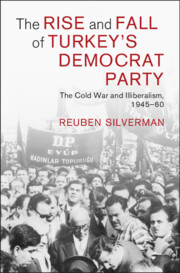Refine search
Actions for selected content:
587 results
Case 3.2 - You Got What?
- from Part III - Case Studies in Mezzo-Level Practice
-
-
- Book:
- Critical Race Theory in Action
- Published online:
- 25 October 2025
- Print publication:
- 13 November 2025, pp 70-80
-
- Chapter
- Export citation
2 - Children of the Revolution: Defining the Democrat Party, 1946–1950
-
- Book:
- The Rise and Fall of Turkey's Democrat Party
- Published online:
- 23 October 2025
- Print publication:
- 06 November 2025, pp 61-98
-
- Chapter
- Export citation
3 - Liberalism(s) and International Security
- from Part I - Security in Theory
-
- Book:
- Understanding International Security
- Published online:
- 11 October 2025
- Print publication:
- 30 October 2025, pp 40-59
-
- Chapter
- Export citation
Veiling in rural Bangladesh: women’s rights consciousness, choice, and subjectivity
-
- Journal:
- Politics and Religion , First View
- Published online by Cambridge University Press:
- 24 October 2025, pp. 1-19
-
- Article
-
- You have access
- Open access
- HTML
- Export citation

The Rise and Fall of Turkey's Democrat Party
- The Cold War and Illiberalism, 1945–60
-
- Published online:
- 23 October 2025
- Print publication:
- 06 November 2025
2 - Overpopulation Discourse and the Post-1945 Order
-
- Book:
- Population Control as a Human Right
- Published online:
- 09 October 2025
- Print publication:
- 23 October 2025, pp 17-31
-
- Chapter
- Export citation
Too Woke or Not Woke Enough? Racial Awareness in the Church of England
-
- Journal:
- Journal of Anglican Studies , First View
- Published online by Cambridge University Press:
- 20 October 2025, pp. 1-23
-
- Article
-
- You have access
- Open access
- HTML
- Export citation
Chapter 1 - Hegel and Liberalism
- from Part I - Hegel, Freedom and Liberalism
-
- Book:
- Hegel Beyond Liberalism
- Published online:
- 27 September 2025
- Print publication:
- 16 October 2025, pp 13-36
-
- Chapter
- Export citation
Introduction
-
- Book:
- Hegel Beyond Liberalism
- Published online:
- 27 September 2025
- Print publication:
- 16 October 2025, pp 1-10
-
- Chapter
- Export citation
Conclusion: Beyond Hegel
-
- Book:
- Hegel Beyond Liberalism
- Published online:
- 27 September 2025
- Print publication:
- 16 October 2025, pp 207-213
-
- Chapter
- Export citation
Chapter 6 - The Dialectic of Political Freedom
- from Part II - Hegel Beyond Liberalism
-
- Book:
- Hegel Beyond Liberalism
- Published online:
- 27 September 2025
- Print publication:
- 16 October 2025, pp 189-206
-
- Chapter
- Export citation

Understanding International Security
- Theory and Practice
-
- Published online:
- 11 October 2025
- Print publication:
- 30 October 2025
-
- Textbook
- Export citation

Hegel Beyond Liberalism
- The Dialectic of Political and Economic Democracy
-
- Published online:
- 27 September 2025
- Print publication:
- 16 October 2025
Between Communal, Emphyteutic, and Private Property: Liberal Experimentation on Agricultural Land in Nineteenth-Century Bolivia
-
- Journal:
- The Americas , First View
- Published online by Cambridge University Press:
- 25 September 2025, pp. 1-24
-
- Article
-
- You have access
- Open access
- HTML
- Export citation
From messianic republicanism to global constitutionalism: the paradigmatic changes of French public law through European law
-
- Journal:
- European Law Open ,
- Published online by Cambridge University Press:
- 22 August 2025, pp. 1-18
-
- Article
-
- You have access
- Open access
- HTML
- Export citation
The Liberal Duty of Factual Justification
-
- Journal:
- Episteme , First View
- Published online by Cambridge University Press:
- 12 August 2025, pp. 1-16
-
- Article
-
- You have access
- Open access
- HTML
- Export citation
Chapter 7 - The Economy in the Feyerabend Lecture Notes on Natural Right
-
-
- Book:
- Kant's Lectures on Political Philosophy
- Published online:
- 18 July 2025
- Print publication:
- 07 August 2025, pp 122-141
-
- Chapter
- Export citation
Stages, orders & periods of welfare state development: a global sequence analysis of social policy dynamics
-
- Journal:
- Journal of Public Policy , First View
- Published online by Cambridge University Press:
- 20 July 2025, pp. 1-28
-
- Article
-
- You have access
- Open access
- HTML
- Export citation
3 - Catholicism and the Italian Welfare State in the Nineteenth Century
-
- Book:
- How Economic Ideas Evolve
- Published online:
- 06 June 2025
- Print publication:
- 10 July 2025, pp 66-95
-
- Chapter
- Export citation
2 - Mapping the PTA Universe in Latin America
-
-
- Book:
- Globalization in Latin America
- Published online:
- 09 June 2025
- Print publication:
- 26 June 2025, pp 10-35
-
- Chapter
-
- You have access
- Open access
- HTML
- Export citation
